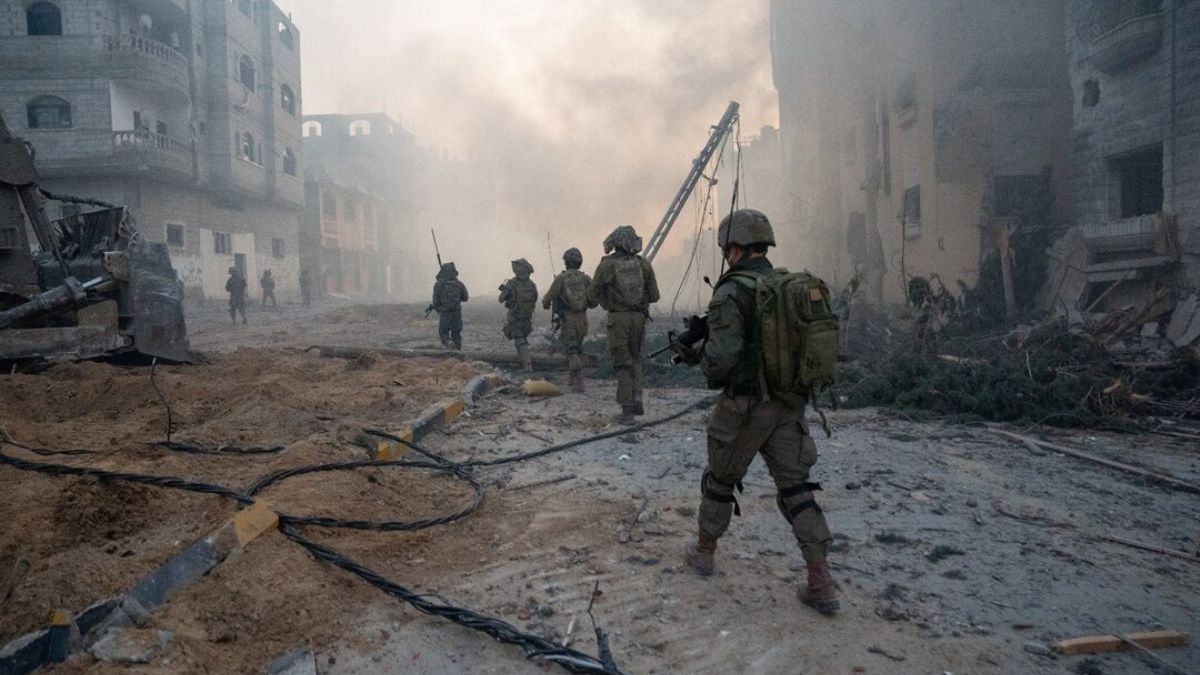The Israeli demand to remain in control of the ‘Philadelphi Corridor’, the strip of land along the Gaza-Egypt border, is behind the deadlocks in Gaza ceasefire deal read more
)
The mediators the United States, Qatar, and Egypt have floated a new bridging proposal for a deal for a ceasefire in the Gaza Strip and the release of hostages (Representative Photo, Credit: Reuters)
Four days of negotiations in the Egyptian capital Cairo failed to produce a deal for a ceasefire in the Gaza Strip and the release of hostages.
Even as mediators Egypt, Qatar, and the United States said the indirect talks between Israel and Hamas are making progress, the disagreement over some key aspects remain — mainly the Israeli demand to retain the control of the ‘Philadelphi Corridor’.
The Philadelphi Corridor is the strip of land along the Gaza-Egypt border, around eight or nine miles (around 13-14 kms) in length. Israeli Prime Minister Benjamin Netanyahu has demanded control of the strip as he stresses that it’s needed to check the cross-border flow of terrorists and weaponry. Israel also maintains that the control of the strip is required to check the building of tunnels in the area.
Even as Israel has been reported to make some concessions in its position, the idea of the Israeli control of the Philadelphi Corridor stands rejected broadly by both Egypt and Hamas.
Talks were constructive, negotiations to continue: Report
Even though no breakthrough was reached in four days of talks, the negotiations were constructive, a US official told The New York Times.
The newspaper further reported that even as the top-level delegation of Israel has returned, working groups of officials will continue to hold discussions in the coming days until the next round of talks involving the top-level delegations are held.
As was the case earlier, the biggest sticking point remains Netanyahu’s insistence on Israelis controlling the Philadelphi Corridor and maintaining checkpoints along another east-west ‘Netzarim Corridor’.
The idea behind the checkpoints along the Netzarim Corridor is to screen the displaced Gazans returning to their homes northward from the southern areas where they are currently sheltering. Netanyahu stresses the screening is needed so that terrorists or weapons don’t make their way to areas that have been cleared of Hamas and other groups in the garb of civilians.
Even as Israel has reduced the number of demands in recent days, including the reducing the number of checkpoints, both Egypt and Hamas have rejected Israel’s current position, according to the newspaper.
How can Philadelphi Corridor issue be resolved?
The discussions on Sunda in Cairo were focussed on finding a middle ground at Philadelphi Corridor and multiple scenarios were discussed, according to the Hebrew-language newspaper Maariv.
Since the negotiators were not at the liberty to strike the deal themselves, they returned to Israel at the end of the sessions to hold discussions with Netanyahu, as per the English version of the report carried by sister-publication The Jerusalem Post.
The report said the negotiators will hold the next round of talks after holding deliberations with Netanyahu.
Throughout the monthslong talks, Netanyahu has been central to the criticism and is credited the blame for the lack of deal. Hamas maintains that it is committed to the original proposal outlined by US President Joe Biden in May, but demands inserted into the proposal later by Netanyahu —the Philadelphi Corridor and Netzarim Corridor being most contested— have tanked the talks. He has also been criticised for not giving the negotiators enough room and authority to arrive at a deal.
Maariv reported that the Sunday’s talks discussed concessions about “Israel’s gradual [partial] withdrawal from the Philadelphi Corridor during the first phase of the agreement” alongside “a promise that no construction work will be carried out on the corridor or attempts to change the existing situation”.
At the same time, the concession included the clause that a “land corridor” will remain to allow the Israeli military to move and reach the area quickly if the need ever arises, according to the report.
The Israeli negotiators said they did not have sufficient authority to accept or reject the proposals and that it needed to discuss them with Netanyahu, said the report.
The talks are currently focused on “a return to the previous agreement that Hamas agreed to, with minor changes, including a gradual and not complete withdrawal from the Strip, in exchange for clear Israeli flexibility regarding the return of the displaced to the north of Gaza”, as per the report.

 3 weeks ago
4
3 weeks ago
4
)
)
)
)
)
)
)
)
)
)
)
)
)
)
)
)
)
)
)
)
)
)
)
)
)
 English (US) ·
English (US) ·